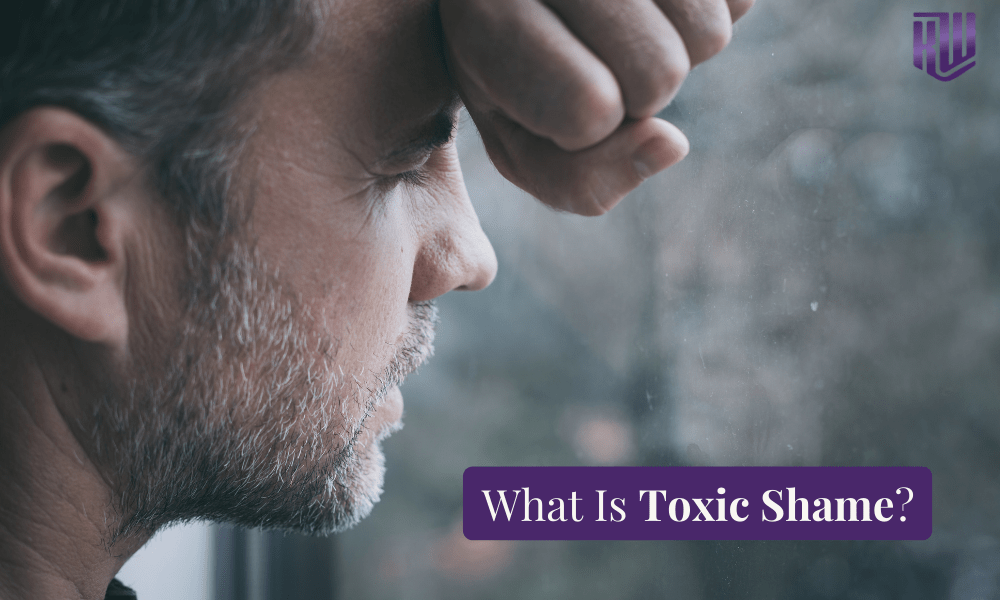Toxic shame is the underlying sense of feeling worthless. As parents, we are human and inherently, perfectly imperfect. Therefore, as children, we were all shamed. For some, those moments are few. For others, they are pervasive. Some individuals will carry this shame throughout life as a state of being rather than related to a specific event. For example, someone who gets angry will see themselves as an angry person rather than being mad at certain circumstances or events. In these cases, this person has lost their authentic self and has become the false shame-based self.
If you would like to see an example of how easily shame is placed on us as children, make sure also to check out the video ‘What is Toxic Shame’ on my YouTube channel. In the video, I show you photographic examples of myself as a child and how my mother’s emotional condition created shame in me as an infant. Remember, as children, we mirror our parents’ emotional condition and effectively become whatever it is our parents are feeling. Parenting isn’t words – effective parenting is predicated on the parent’s emotional availability.
Toxic shaming happens throughout our upbringings. Through seemingly innocuous split-second emotional moments, like giving brief, disdainful glances or exasperated replies. If the shame remained an episodic event, this would be less harmful, but this shame is almost always continuous. The child then internalizes it, and it becomes who they are. The problem is that, as a culture, we still downplay the need for education and taking responsibility for developing Emotional Authenticity. The result of not being taught how to deal with this shame or how to master our emotions has most people living in a state of sadness, shame, and depression.
What is at the heart of toxic shame?
Most of us become parents somewhere between the ages of 16-30. We are still trying to complete our maturation process, make sense of our imperfect childhoods, and figure out our life direction and careers. These are tremendously big questions and require intense emotional investment in ourselves to figure out. Even parenting experts or older, more settled adults who understand the dynamics and the dangers of certain behaviors will not get parenting right because it is an overwhelming responsibility. Therefore, it is only natural that we won’t be entirely emotionally available to our children. This emotional abandonment is at the heart of toxic shame.
The helicopter parent who emotionally smothers and enmeshes with their child is one way. This is a parent who uses their child to feed their emotional needs, which sucks the emotional life out of the child. Instead of creating an emotional connection with another adult, these parents need their children to need them and to give them what’s missing in their emotional lives. This is a severely toxically shamed parent who is now doing the same to their child. You often see this with single parents or couples who are not close. The child becomes the surrogate spouse.
Another way parents implant toxic shame into a child is through overly structured parenting. The child is not allowed to be a child and is ‘parentified.’ They cannot make mistakes or show perfect imperfections. If they do, the parents send the message that they are defective rather than the behavior needing adjustment.
What is the other end of the spectrum?
This could either be no structure at home or the parent who effectively counts the days until the child is old enough to look after themselves, telling them to ‘Grow up!’
The following example is difficult to mention, but it needs to be raised—children who are raised by nannies or daycare centers experience emotional abandonment. The child becomes confused about who to attach with, causing shame because they experience repeated abandonment. It would be expected to feel I am saying that if you have to place your child in daycare, I am implying you are a bad parent. However, single-parent homes and having to put children in daycare are just a current fact of life. It is a survival choice. That does not make a parent bad. However, every choice has consequences, and as parents, we owe our children to take ownership that our life choices created situations that emotionally abandoned our children. Denying these facts only increases shame.
In my experience, the most damaging parent is the one who refuses to own and admit that they were imperfect and denies that they imparted some shame on their child—placing themselves in a perfectionist, God-like position is the most abusive form of shame a parent can impart.
A word of caution. For those stuck in the belief that your childhood was perfect and that nothing from your childhood affects you to this day, you are deep in denial of the shame you experienced. (stage 4 of The Worst Day Cycle) This happens in homes where the parents so shamed a child that they are not allowed to experience truth. The child’s soul is sacrificed to glorify the parent. As an adult, admitting their parent’s imperfections would be equivalent to blasphemy and speaking against the diety!
What it is like to experience toxic shame
As author John Bradshaw puts it,
‘When we are exposed without any way to protect ourselves, we feel the pain of shame. If we are continually overexposed, shame becomes toxic. The self becomes an object of its own contempt, an object that can’t be trusted. Shame is internalized when one is abandoned. Abandonment is the precise term to describe how one loses one’s authentic self and ceases to exist psychologically. Children cannot know who they are without reflective mirrors. Mirroring is done by one’s primary caregivers and is crucial in the first years of life. Abandonment includes the loss of mirroring. Parents who are shut down emotionally cannot mirror and affirm their children’s emotions.
If our caretakers have a wounded inner child, their neediness will prevent them from meeting their own children’s needs. Instead, they will either be angry at their child’s neediness or will try to get their own needs met by making their child an extension of themselves. When a child’s feelings are repressed, especially the feelings of anger and hurt, a person grows up to be an adult with an angry, hurt child inside of him. This hurt child inside of them will spontaneously contaminate that person’s adult behavior.’
This is the essence of the worst day cycle-we repeat the behavior we have always known and go on to contaminate others repeatedly.
24 Characteristics of Toxic Shame
To help you identify the signs of toxic shame, below is a list of 24 feelings or experiences you may have had or be going through now:
1. Secrecy – fear of exposure, going into hiding
2. Feeling used, treated with little or no respect
3. Feeling like you have little impact
4. Worried about what others think of you
5. Feeling like others take advantage of you
6. Wanting to have the last word
7. Not sharing your thoughts or feelings to avoid embarrassment
8. Being afraid to look, act or sound inappropriate or stupid
9. Being a perfectionist
10. Feeling like an outsider or that you are different or left out
11. Feeling suspicious or like you can’t trust others
12. Not wanting to be the center of attention, wallflower, shy, trying to hide, or withdraw
13. Feeling that you can’t be your true self
14. Losing your identity
15. Feelings of regret
16. Anger, both toward yourself and others
17. Self-loathing, or that you are stupid, a failure, a bad person, a fraud, selfish, not enough, you don’t matter, defective, unlovable, shouldn’t have been born
18. Worry and fear
19. Poor relationships/relationship instability and violence
20. Addiction
21. Can’t say no to yourself or others
22. Triggered and have significant reactions to anything that feels disapproving, critical, judging, or rejecting
23. No ability to set boundaries, or you have excessive guilt for setting them
24. Grandiose, better than, arrogance, workaholics, doers, falsely empowered
What is healthy shame?
Healthy shame allows for mistakes. It sees them as a gift and our best teachers. Healthy shame has grace, self-forgiveness, and acceptance of our humanity. Healthy shame recognizes when help is needed and that there are limitations to the healing that one can do. It’s creative, and rather than trying to cancel people that trigger us, someone with healthy shame learns about other views.
So, what are the solutions to healing toxic shame? It has been my experience that until we become experts in The Worst Day Cycle and Emotional Authenticity and develop the knowledge, skills, and tools to conquer our trauma, fear, shame, and denial, we will experience topic shame our entire lives.
To provide people with the knowledge, I wrote my book, ‘Your Journey to Success’ which lays out The Worst Day Cycle and how it operates in your life, keeping the toxic shame alive. To help people heal and develop the skills and tools, I created My Complete Emotional Authenticity Method.
Additional solutions:
1- My book, Your Journey To Success
2– My Complete Emotional Authenticity Method
3– My Perfectly Imperfect Private Group
Learn more here:





